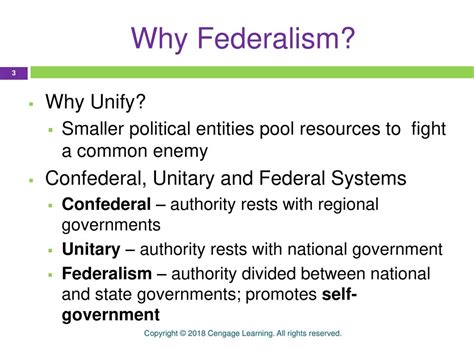The allocation of authority in a federal political system is a complex and often contentious issue. Federal systems, by their very nature, divide power between a central government and multiple regional or state governments. This division of power can lead to disputes over who has the authority to make decisions in different areas of policy.

Types of Federal Systems
Federal systems can be classified into two main types:
- Symmetrical federalism: In a symmetrical federation, the central government and the regional governments have equal powers.
- Asymmetrical federalism: In an asymmetrical federation, the central government has more power than the regional governments.
The United States is an example of a symmetrical federation. The federal government and the states have equal powers in many areas, such as taxation, defense, and foreign policy. However, the federal government has exclusive authority over some areas, such as regulating interstate commerce and conducting foreign affairs.
Canada is an example of an asymmetrical federation. The federal government has more power than the provinces in many areas, such as taxation, defense, and foreign policy. The provinces have exclusive authority over some areas, such as education and healthcare.
Distribution of Authority
The distribution of authority in a federal system is typically determined by the constitution. The constitution will specify which powers are reserved for the central government, which powers are delegated to the regional governments, and which powers are shared between the two levels of government.
In the United States, the Constitution reserves certain powers for the federal government, such as the power to declare war, regulate interstate commerce, and coin money. The Constitution also grants the states certain powers, such as the power to regulate intrastate commerce and establish local governments. The Constitution also provides for a system of shared powers, such as the power to tax and spend.
In Canada, the Constitution sets out a more general division of powers between the federal government and the provinces. The federal government has exclusive authority over some areas, such as criminal law and defense. The provinces have exclusive authority over some areas, such as education and healthcare. The federal government and the provinces share authority over some areas, such as taxation and social welfare.
Disputes Over Authority
Disputes over authority are common in federal systems. These disputes can arise when the central government and the regional governments disagree about who has the authority to make decisions in a particular area of policy.
In the United States, for example, there have been numerous disputes over the authority of the federal government to regulate environmental protection, healthcare, and education. The states have argued that these areas are matters of state sovereignty, while the federal government has argued that it has a responsibility to protect the welfare of the entire nation.
Resolving Disputes
Disputes over authority in federal systems can be resolved through a variety of mechanisms, including:
- Negotiation: The central government and the regional governments can negotiate agreements to resolve disputes over authority.
- Litigation: The central government or the regional governments can file lawsuits to challenge the authority of the other level of government.
- Constitutional amendment: The constitution can be amended to change the distribution of authority between the central government and the regional governments.
Conclusion
The allocation of authority in a federal political system is a complex and often contentious issue. Disputes over authority are common, and these disputes can be resolved through a variety of mechanisms. The distribution of authority in a federal system can have a significant impact on the way that the system functions, and it is important to understand the different ways that authority can be allocated.
Additional Resources
- The Council of State Governments
- The National Governors Association
- The United States Conference of Mayors
Keywords
- Federalism
- Authority
- Central government
- Regional government
- Constitution
- Disputes
- Negotiation
- Litigation
- Constitutional amendment
